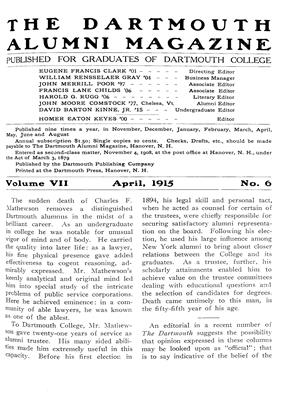To divorce Dartmouth class elections as far as possible from the stigma of dealing in votes, particularly between cliques in the individual classes, the No-Deal agreement was advocated three years ago by Palaeopitus. At that time, it was adopted into the by-laws of each of the four undergraduate classes, in substantially the same form. It provided, in brief, that individual members of the class should not attempt to influence other members in favor of, or against either men or measures concerned in elections, and that if Palaeopitus had presumptive proof of the violation of the agreement, the election might be declared void.
Under this regime, the practice of trading votes for various candidates may have ceased for a while, but this sudden accession of virtue was shortlived. The chief difficulty came, however in the enforcement of the agreement, since it is practically impossible to determine without a minute cross-examination, whether dealing has actually entered into an election. Palacopitus found it impossible to substantiate charges against any man, and consequently the agreement became a dead letter upon the statute books.
The question immediately arose as to whether elections might not be better governed by the individual conscience, rather than by any fixed and arbitrary agreement. With some thought of this kind, the present junior class, freshmen at the time the agreement was adopted, repealed the provision at its February class-meeting, with the plan, however, of arranging some new methods for the conduct of elections. Among the possibilities in this line, as suggested by the committee appointed at that time, are the abolition of the rule requiring the signing of ballots, in favor of a complete Australian ballot system. This provision, editorially supported in TheDartmouth, would tend toward the prevention of dealing, since no one would be able to ascertain whether the trade had been lived up to on both sides. The general tendency in student government seems to be toward less legislation, and more individual honesty—a movement which can hardly-fail to be productive of greater results than a dead-letter agreement.
 View Full Issue
View Full Issue
More From This Issue
-
 Article
ArticleANNUAL MEETING OF THE DARTMOUTH SECRETARIES' ASSOCIATION
April 1915 By Gray Knapp '12 -
 Class Notes
Class NotesLOCAL ASSOCIATIONS
April 1915 -
 Article
ArticleThe sudden death of Charles F.
April 1915 -
 Article
ArticleALUMNI PUBLICATIONS
April 1915 By ERVILLE B. WOODS -
 Article
ArticleTHE TRUSTEES' MEETING
April 1915 -
 Article
ArticleCANDIDATES FOR ALUMNI TRUSTEE
April 1915
Article
-
 Article
ArticleNATIONAL RESEARCH FELLOWSHIPS IN PHYSICS AND CHEMISTRY
April 1919 -
 Article
ArticleHolmes Lecture on May 10 To Mark Sesquicentennial Of Dartmouth College Case
APRIL 1968 -
 Article
ArticleResearchers Honored
Mar/Apr 2012 -
 Article
ArticleFootball Notes
November 1956 By CLIFF JORDAN '45 -
 Article
ArticleFRESHMAN FOOTBALL
DECEMBER 1972 By Jack DeGange -
 Article
ArticleObligations of the Educated
September 1995 By James O. Freedman

